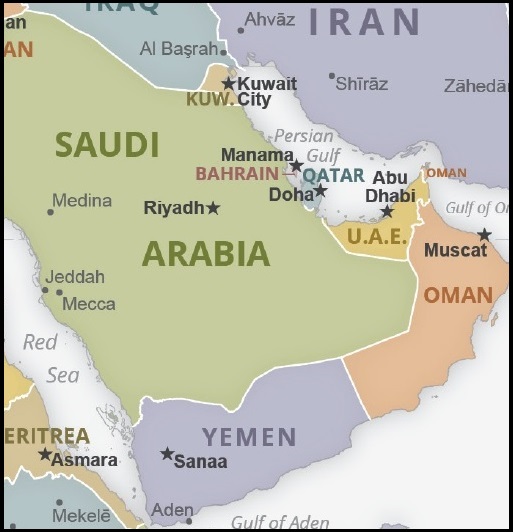On November 25, a U.S. warship seized a significant cache of Iranian weapons bound for Yemen’s Houthi rebels. A U.S. Navy and U.S. Coast Guard boarding team interdicted the weapons during a flag verification of a small wooden boat in the northern Arabia Sea. “An initial investigation indicates that these advanced missile components are of Iranian origin,” said Commander Sean Robertson, a Pentagon spokesperson. On December 5, the U.S. Special Representative for Iran, Brian Hook, revealed that components of anti-ship cruise missiles, land attack cruise missiles, air defense missiles, and anti-tank missiles were found. “The weapon components comprise the most sophisticated weapons seized by the U.S. Navy to date during the Yemen conflict,” he said.
 Hook also announced a reward of up to $15 million for information on Abdul Reza Shahlai, a Revolutionary Guards Qods Force commander based in Yemen. Shahlai was previously accused of planning attacks on the U.S.-led coalition in Iraq and an assassination attempt on the Saudi ambassador to Washington in 2011.
Hook also announced a reward of up to $15 million for information on Abdul Reza Shahlai, a Revolutionary Guards Qods Force commander based in Yemen. Shahlai was previously accused of planning attacks on the U.S.-led coalition in Iraq and an assassination attempt on the Saudi ambassador to Washington in 2011.
Iran is widely accused of backing the Houthis, a Zaydi Shiite movement that has been fighting Yemen’s Sunni-majority government since 2004. The Houthis took over the Yemeni capital Sanaa in September 2014 and seized control over much of north Yemen by 2016. Yemeni officials and Sunni states have repeatedly alleged that Iran and its proxy Hezbollah have provided arms, training, and financial support to the Houthis. But Iranian and Hezbollah officials have denied or downplayed the claims. Smuggling weapons into Yemen is banned under a U.N. Security Council resolution. The U.N. Security Council banned the export of arms from Iran in 2007.
In 2015, a Saudi-led coalition launched airstrikes against Houthi targets in Yemen. Since 2017, the Houthis have fired ballistic missiles at several strategic targets in Saudi Arabia. The war between the Houthis and Yemen’s internationally recognized government and its supporters has dragged on, despite U.N. efforts to broker peace talks. The following is a transcript of Hook’s remarks on Yemen.
Special Representative for Iran and Senior Advisor to the Secretary Brian Hook
"On November 25th, a U.S. warship conducted a flag verification boarding in international waters off the coast of Yemen. We interdicted a significant hoard of weapons and missile parts, evidently of Iranian origin. As you can see from the images behind me, the seizure includes sophisticated weapons, sophisticated components of anti-ship cruise missiles, land attack cruise missiles, air defense missiles, and anti-tank missiles. The vessel reportedly was heading to Yemen to deliver these weapons. The weapon components comprise the most sophisticated weapons seized by the U.S. Navy to date during the Yemen conflict. I want to congratulate the U.S. Armed Forces and the U.S. Coast Guard for this important interdiction.
"This discovery is yet more proof of Iran’s efforts to inflame conflicts in the region by proliferating deadly weapons to its proxies. It is also further evidence of how Iran repeatedly violates the UN arms embargo which has been in place for over a decade.
"We should recall that the Houthis proposed a cessation of missile and air attacks with Saudi Arabia just days after the Iranians struck Saudi oil installations on September 14th. The Houthis’ de-escalation proposal, which the Saudis are responding to, shows that Iran clearly does not speak for the Houthis, nor have the best interests of the Yemeni people at heart. Iran is trying to prolong Yemen’s civil war to project power. Iran should follow the calls of its own people and end its involvement in Yemen. The Yemeni people have suffered far too long, and Iran has no legitimate interests in Yemen.
"Also relating to Yemen, I am announcing today that the State Department’s Rewards for Justice program is offering up to $15 million for information on the financial activities, networks, and associates of Abdul Reza Shahlai. He is a Yemen-based high-ranking commander of the IRGC’s Qods Force. This is a part of the Rewards for Justice program for information leading to the disruption of IRGC operations. Shahlai has a long history of attacks Americans and our allies globally. He planned multiple assassinations of coalition forces in Iraq, provided weapons and explosives to violent Shia extremist groups, and planned the January 20th, 2007 attack in Karbala that killed five American soldiers and wounded three others. In 2011, Shahlai funded and directed a plot to assassinate the Saudi ambassador to the United States, Adel al-Jubeir. This would have been carried out in a restaurant in Georgetown. Shahlai also aimed to carry out follow-on attacks in the United States and elsewhere. Had this scheme succeeded, as many as 200 innocent civilians in the United States could have been killed.
"Given Shahlai’s track record of terrorism and destabilization in Iraq, we remain gravely concerned by his presence in Yemen and potential role in providing advanced weaponry of the kind that we have interdicted to the Houthis. Iranian UAVs, missiles, and explosive boats have been used by the Houthis to threaten key civilian and economic interests and otherwise wreak havoc in the region. This designation, together with the recent interdiction in Yemen, underscores our commitment to deny Iran the means to run an expansionist foreign policy. We call on the international community to join us in holding Iran accountable for its acts of terror both against the nations of the world and against the Iranian people."
